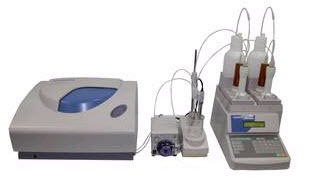The new LY-701 automates pH titration for zeta potential measurements on the SZ-100 dynamic light scattering (DLS system).

The LY-701 automates iso-electric point (IEP) determinations - the pH at zero zeta potential - by automatically adjusting pH and transferring the sample to the SZ-100 for zeta potential analysis. The system can also be used for studies investigating the change in size and zeta potential as a function of the concentration of other chemicals such as surfactants or salts.
This is useful for emulsion and nanoparticle new product formulation where an increase in zeta potential is an indication of a more stable dispersion. Other applications include the study of proteins where zeta potential is a useful measurement to predict stability.
The patented zeta potential cells constructed with carbon electrodes used in the SZ-100 are designed to provide extended life time (and lower the cost of ownership) for samples such as proteins. Older designed cells would typically degrade over the course of a pH titration of a protein sample, but the SZ-100 can perform hundreds of measurements using a single cell.
The system can be used in research, but is also simple enough to be used as a QC tool where the IEP provides valuable information about the surface characteristics of dispersions such as titanium dioxide, alumina, and zinc oxide. Titrations are controlled through the SZ-100 software, completely automated the process and data generation.
For more information, please contact Carol Madden, Marketing Specialist
HORIBA Instruments Inc., 34 Bunsen, Irvine California 92618, 800-446-7422
www.horiba.com/particle
About HORIBA
HORIBA Scientific is the new global team created to better meet customers’ present and future needs by integrating the scientific market expertise and resources of HORIBA.